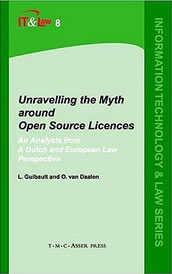BOOK REVIEW
UNRAVELLING THE MYTH AROUND OPEN
SOURCE LICENCES: AN ANALYSIS FROM A DUTCH AND EUROPEAN LAW
PERSPECTIVE
By
Lucie Guibault and Ot van Daalen, The Hague: TMC Asser Press,
2006. 211 pp, £43.00, ISBN 9789067042147.

Download options |
 |
|
DOI: 10.2966/scrip.040407.490 |
||
One of the perks of academic specialisation in law is that one gets to review several books related to one’s area of interest, and therefore it is possible to get a comprehensive idea of the literature covering the chosen topic. This has been this reviewer’s experience with the subject of Free and Open Source Software (FOSS) licensing models. In an earlier review,1 I set myself a standard to measure new books that deal with legal implications of the FOSS phenomenon, which is to ask whether the book adds anything to the growing body of literature covering open licences.2 I am glad to say that this book not only meets that standard, it surpasses it because it is a unique addition to the literature.
One of the characteristics of most books which offer legal analysis of open source licences is that they are written with Common Law jurisdictions in mind.3 This is only natural, as English-speaking readership will be more likely to live in such jurisdictions, but the unfortunate result has been that those same audiences have been deprived of analysis which recognises the existence of issues exclusively affecting Civil Law jurisdictions. These include contract formation, formal validity, moral rights and many other circumstances that may have tremendous relevance to the validity of such licences in Continental legal traditions. This is what makes Unravelling the Myth around Open Source Licences such a welcome addition to the existing literature. While the book is written with Dutch Law as its guide, I found the book extremely useful in its analysis of open source licences from the Civil Law perspective, even for those who are not Dutch. The cross-pollination that has occurred in European Private Law means that this book will be a valuable tool also to many of us not familiar with the legal system of the Netherlands. This tome offers precisely what many of us writing and researching in this field needed: a concise and scholarly work which offers a counter-point to the American-centric literature.
The first three chapters offer the reader with the obligatory introduction to the concepts, philosophies, movements, practices, and licences prevalent in the open source movement; paying special care to describe the main licences which will be studied throughout the book. These sections will be more useful to those unfamiliar with this field of study. Even with this in mind, I found some of the detail in these introductory sections very helpful, particularly the analysis of the core elements present across different licences [pp15 - 22].
However, it is in chapters Four and Five where the book really shines and becomes obligatory reading. Chapter Four deals with Private Law issues, particularly contract formation, limitation of liability, and the validity of the copyleft clause in Civil jurisdictions. While a lot of the analysis is based on the Dutch Civil Code, there are several mentions to other European legislation. If there is any criticism to be made of this thoroughly argued chapter, it is that the authors ignored the existing debate with regards to the legal nature of FOSS licences;4 the authors rightly assume that at least in Civil Law systems the licences are contracts, but do not pay any heed to the wider discussion about this. Nevertheless, this is a minor quibble in an otherwise comprehensive analysis.
Chapter Five handles copyright law in a similarly authoritative manner. I found the discussion on joint authorship and the nature of works created on the course of employment to be particularly enlightening because of the collective nature of open source software development. Similarly valuable was the discussion on moral rights, especially because software in the UK is exempted from this type of protection,5 and therefore I found the contrast with Continental practice to be a welcome addition to the scholarship in this subject.
Chapter Six covers open source licences and patent law, but unfortunately I found this section less useful than the previous ones, although this is not though fault of the authors. At the time of writing the book, several key developments affecting the patentability of software in Europe were still under discussion, or had not taken place altogether. The book discusses the proposed Directive on Patentability of Computer-implemented Inventions,6 which was rejected by the European Parliament in 2005. Similarly, the book was written before the first draft of the version 3 of the General Public Licence was released to the public, which is unfortunate as it contains some interesting clauses with regards to software patents. Nevertheless, this should not detract from the existing analysis.
To conclude, this book should be part of the library of all of those
who specialise in the legal analysis of open source software,
regardless of their jurisdiction of origin. The content justifies the
£43 GBP price tag, but unfortunately it may make it
inaccessible to a wider audience. In short, this is a highly
recommended book.
Andrés
Guadamuz
University of Edinburgh
© Andres Guadamuz

This work is licenced under a
Creative Commons Licence.
2 Amongst others, see: RA Ghosh, Code: Collaborative Ownership and the Digital Economy (2005); S Weber, The Success of Open Source (2004); C DiBona et al., Open Sources 2.0: The Continuing Evolution (2006); LE Rosen, Open Source Licensing: Software Freedom and Intellectual Property Law (2004).
3 This statement applies only to English-language literature. There is a growing body of literature in other languages centred on Civil Law. Some books include: JG Barahona et al, Introducción Al Software Libre (2003); and M Carranza Torres, Problemática Jurídica Del Software Libre, 1a. (2004).
4 Contrast P Jones, "The GPL is a license, not a contract" (2003), Linux Weekly News, http://lwn.net/Articles/61292/, with Rosen, see note 3 above 57-66.
5 s79 Copyright, Designs and Patents Act 1988.
6 COM(2002) 92.
